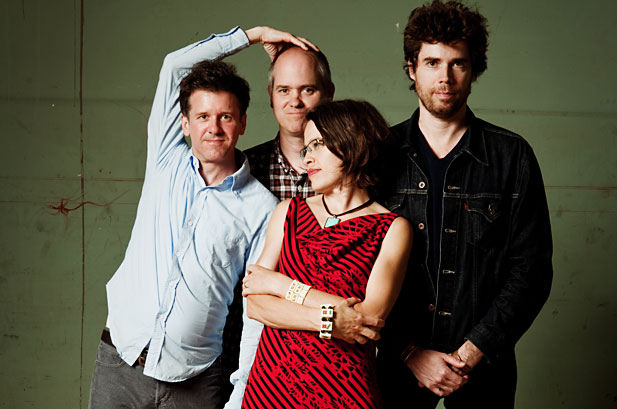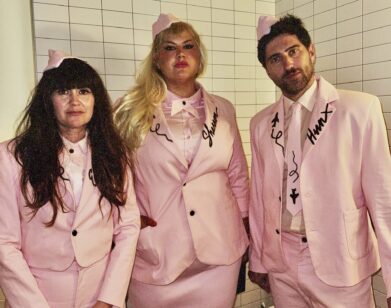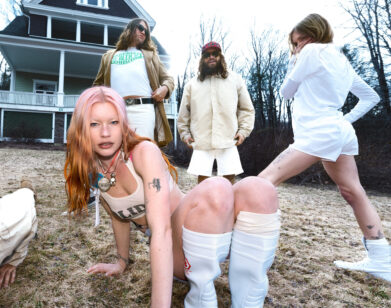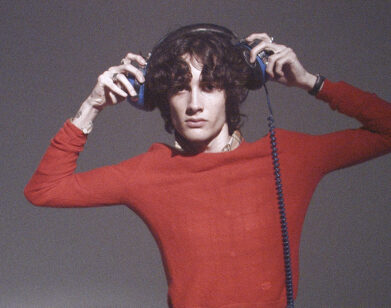Still Shredding: Superchunk

Of all the beloved indie rock bands who’ve reunited in the past couple of years to tour and in a few cases to record—The Pixies, Slint, My Bloody Valentine, The Jesus Lizard, Polvo, Versus, The Vaselines and Pavement—only one, the venerable Superchunk, can lay claim to helping found one of indie-dom’s leading labels. The power pop gods from Chapel Hill, North Carolina, turned out some of the most essential albums of the 1990s, and count among their ranks Mac McCaughan and Laura Ballance, co-founders of Merge Records, the company whose roster over the past 21 years has included The Magnetic Fields, Neutral Milk Hotel. Conor Oberst, Polvo, Spoon, She & Him and Arcade Fire. Running a label of that significance, to say nothing of starting families, meant that for much of the past decade, Superchunk was on hold. In recent years, the band—Ballance, McCaughan, Jim Wilbur and Jon Wurster—have resurfaced for one-off shows and very short runs, but no new record, until now. Superchunk have delivered their first album in nine years, Majesty Shredding, that finds the 40-somethings sounding just as fresh and fun as they did back in the days when they were just kids “dancing on the propane tanks,” as their high-powered new single “Digging For Something” alludes to.
In 2010, Superchunk took a different approach to songwriting this time around, and a saner approach to touring, as at least a couple of them would just as soon be in bed at 11pm instead of taking a stage. I met up with the band recently at Brooklyn’s Music Hall of Williamsburg to talk about all that and more, including why we’re seeing reunion fever spreading among bands of the Nineties.
JOHN NORRIS: Why was this the right moment for a new record, rather than two years ago, four years ago? I understand scheduling had something to do with it?
MAC MCCAUGHAN: I think it’s been building up to it. I think we first started talking about it two years ago, and trying to figure out how we could write a record and make a record now, with everyone having different lives and different schedules than we did nine years ago, the last time we made a record. I think also we had to get in the mindset of “Are we ready to tour again?”, and play more than a show here or there. Because when we became kind of less active, a lot of it was being burnt out on touring.
NORRIS: Did you guys enjoy the last couple of years where you could just do one-offs or a couple of shows here and there?
JIM WILBUR: Yeah of course, it’s nice to have like three shows a year, maybe so that you know that you’re still doing it? I always thought “Well my career in rock is not dead yet, because next December we have to go do that thing.” But it was also nice to not have it be a day job almost, where you’re just doing it all the time. But with the album and the tour, it’s like one thing follows the other. If you’re gonna have the child you’ve gotta commit to raising it, kind of. You know, you don’t just deliver the child and forget about it.
NORRIS: And was there a lot of schedule adjusting? Jon you seem crazy busy, whether it’s other bands like the Mountain Goats, or your radio show with Tom Scharpling at WFMU. Was there a lot of juggling that had to be done knowing that this tour was coming up?
JON WURSTER: Kind of, but things worked out really well though where, we’d known far enough in advance where I could say “I have this week free, let’s grab three or four songs and go record”, and so it worked out. But you needed enough advance word so that you could kind of figure it out.
NORRIS: And in fact the tour is happening in sort of short bursts, which works for you guys?
WILBUR: Oh totally, and I think if we were to try and hit it for two or three weeks at a time, it would be way less enjoyable.
MCCAUGHAN: I would hurt even more than I hurt right now.
NORRIS: In the show at Bowery Ballroom last night you said before one song, “We are so tired, and we’ve only done two shows on this tour!”
LAURA BALLANCE: Isn’t that pathetic?
WURSTER: Well it’s just going on so late. We’re going on at eleven!
MCCAUGHAN: When we’re usually going to bed at that time…
NORRIS: Laura I always got the impression you were the one least into the idea of spending long stretches on the road?
BALLANCE: It’s completely true. I am a homebody. I would much rather be at home, getting ten hours of sleep a night. But that does not happen on tour.
NORRIS: So when the idea two years ago was being floated about doing a new record which would obviously involve a tour, were you the least into the idea?
BALLANCE: When the idea of making a record first came up and writing songs, I said, “We’ll see how it goes.” I did not say that I would do anything. I am free to stop at any time. (LAUGHS)
NORRIS: Mac this time, for Majesty Shredding you really worked out the basic songs on your own. Was it just easier to do it like that?
MCCAUGHAN: Yeah, in some ways it was like the earlier records were I would make demos and send them around. Because now it just would not work to write songs in the way we did for a long time there which was everyone just getting together and starting from scratch really and writing an album’s worth of songs. Which takes hours and hours every week. So we just found a way that it could work, in the same way that Jon was saying that recording happened in short bursts of recording over the course of a year. We just had to adjust the way that we did everything really to make it work but I think in the end it resulted in a really good record.
NORRIS: Because you guys didn’t fall of the radar for nine years and have been doing live shows especially more recently, I don’t think ‘reunion’ is the proper term but God knows we have seen recently band of a certain era that have reunited, both with new albums like Polvo did last year or without new records like Pavement are doing right now. Do you see anything fundamentally different about those two approaches? Is it more fun, being out with new songs to play, from Majesty Shredding?
MCCAUGHAN: I think that when we were just doing a show here or there, playing you know just drawing from our catalogue and there were plenty of songs that people wanted to hear, but at some point yeah I guess you sort of wish that you had some new songs to play. I think it definitely makes the set more fun for us.
WILBUR: It’s less like you’re doing a corpse viewing too. You know if you’re just playing songs that are over 10 years old, you know trotting them out over and over again, it would feel a little like, ‘what’s the point?’
WURSTER: Having new songs just makes you feel like you’re current and that you’re ‘doing something’ and not just trotting out the old hits.
WILBUR: Otherwise you might as well just be playing state fairs you know?
BALLANCE: My concern was that people wouldn’t care about the new record, that they would be like “Yeah, new record, I just want to hear ‘Hyper Enough,’ come on!” But people do seem to care.
NORRIS: Last night I felt like some of the new songs like “My Gap Feels Weird” got as big a reaction as the old favorites.
MCCAUGHAN: Yeah that’s been really weird for me as well, people singing along to the new songs as well as the old songs. And as far as reunions go, I mean, I’ve gotten to see Pavement a couple of times so far, since they’ve gotten back together. It’s been great. I think in some ways they’re better than the last time I saw them, however long ago. And those guys are interesting because they talk about it as something that has a definitive end. You know like “we’re gonna do this for a year” or whatever, and they don’t even say “Oh we might make a record” and to me that’s a cool way to do it. But a band like the Pixies, they got back together and they’re still on their reunion tour and it’s like five years later.
NORRIS: Do you guys have any thoughts on why in this concentrated period of time we’ve seen this spate of bands re-emerging after being dormant for ten or fifteen years?
BALLANCE: I think it has a lot to do with us reaching a certain age and, we’re in charge now. You know what I mean? Like, NPR now, it used to be like classical music, old people’s stuff, and now you’re hearing modern music, formerly underground things on there. And I think it’s because all of the people that were in the 1990s appreciating these things, they’re now grownups and they get to have a say in the matter.






